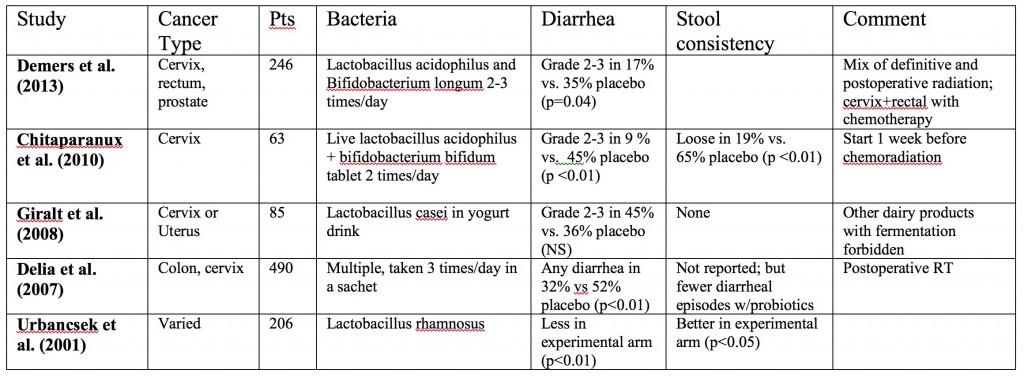Four Reasons to Consider Probiotics with Radiation Therapy
Pelvic radiation can cause significant diarrhea, cramping and other side effects due to injury to the gastrointestinal mucosa, or lining of the gut. These symptoms are not only a bother but can lead to treatment delays, hospitalization or additional medical treatment. Taking probiotics, certain “healthy” bacteria that live inside of us already, may help make radiation easier and safer for cancer patients.
Radiation enteritis is a common side effect for cancers of the anal canal, bladder, cervix, pancreas, prostate, rectum, vulva and uterus. It can contribute to discomfort, annoying trips to the bathroom, accidents, dehydration and generally feeling lousy.
Radiation injury can alter bowel flora, and many patients get chemotherapy at the same time. Probiotics come in different forms, but they are bacteria that normally live in the gut when we’re healthy. Here is how replacing them can help make radiation therapy better:
1. Fewer side effects. Published research now increasingly shows that probiotics can lessen side effects.
These studies aren’t perfect, but it suggests that there are simple ways to lessen the toxicity of pelvic radiation. In a newly published guideline by the Multinational Association of Supportive Care in Cancer, probiotics can lessen gastrointestinal mucositis. Of the published studies I came across, there is no increased risk of sepsis or other side effects from probiotics.
The benefits may not be limited to the below the diaphragm. A randomized trial of 200 head and neck cancer patients showed that using a Lactobacillus brevis lozenge improved the chances of completing treatment (92% vs. 70%, p< 0.01) with less grade 3-4 mucositis (52% vs 77%, p<0.01).
2. Better treatment accuracy. As radiation planning becomes more precise, the importance of reproducible setup, including internal organs, increases. In prostate cancer, changes in rectal size can influence the accuracy of treatment. A prospective randomized study of 80 prostate cancer patients in Korea suggests that Lactobacillus acidophilus capsule twice a day decreases rectal volume changes during treatment. More consistent setups internally may allow better cancer control, less side effects with smaller margins, or both.
3. Fewer treatment breaks. One of the concerns with extended radiation treatment times is tumor repopulation which can lower cure rates. This has been a concern in cervical cancer but can be with any tumor. If patients have less side effects, there will be fewer treatment breaks. The head and neck study above is a good example but was less well studied in the pelvic radiation studies I found.
4. Avoiding secondary complications. Chemotherapy and radiation can both increase the likelihood of Clostridium difficile infection –a risk for major illness and creates complicated patient management for infection control. Using probiotics may prevent C. difficile infections, but this should be studied properly in cancer patients.
Implementing use of probiotics is pretty straightforward, but they’re not all the same. You have to look into whether the preparations you can buy online or at the pharmacy are similar to these studies. But given the potential benefits, I think it’s a worthwhile consideration to discuss.
Have you used probiotics during radiation or chemotherapy? What do you think? I would love to hear what your experiences have been.
Research:
1. Demers et al. http://www.clinicalnutritionjournal.com/article/S0261-5614(13)00274-4/fulltext
2. Chitaparanux et al. http://www.ro-journal.com/content/5/1/31
3. Giralt et al. http://www.redjournal.org/article/S0360-3016(07)04510-5/abstract
4. Delia et al. http://www.wjgnet.com/1007-9327/full/v13/i6/912.htm
5. Urbancsak et al. http://www.ncbi.nlm.nih.gov/pubmed/11338068
6. Sharma et al. http://www.ejcancer.com/article/S0959-8049(11)00404-7/abstract

